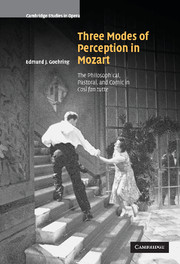Book contents
- Frontmatter
- Contents
- List of tables
- Preface and acknowledgments
- A note on translations
- List of abbreviations
- Chapter 1 An overture to Così fan tutte: the poetics of the opera over two centuries
- Chapter 2 The philosophical mode
- Chapter 3 The pastoral mode
- Chapter 4 The comic mode
- Epilogue
- Bibliography
- Index
Chapter 2 - The philosophical mode
Published online by Cambridge University Press: 22 September 2009
- Frontmatter
- Contents
- List of tables
- Preface and acknowledgments
- A note on translations
- List of abbreviations
- Chapter 1 An overture to Così fan tutte: the poetics of the opera over two centuries
- Chapter 2 The philosophical mode
- Chapter 3 The pastoral mode
- Chapter 4 The comic mode
- Epilogue
- Bibliography
- Index
Summary
No Mozartean character quite matches the authority of Così fan tutte's philosopher, Don Alfonso. To find his rival in this area, one would have to turn to the deities, shades, or priests of Mozartean opera, its Neptunes, Commendatores, or Sarastros. Yet even this comparison gives only a partial context for understanding the nature and breadth of Don Alfonso's command. The chthonic or priestly figures of Mozart opera represent larger, external agencies. Don Alfonso, in contrast, is autonomous. He is the deus ex machina in a drama of his own making, dispensing wisdom, meting out justice, moving events, granting reconciliation. This stature has generally made a critical evaluation of Don Alfonso and one of the opera pretty much the same thing: as Don Alfonso goes, so goes Così fan tutte. Where he is viewed as the cold cynic, the opera fails to yield a satisfying portrait of human passion and reason. Where he is regarded as an advocate of tolerance and moderation, the piece acquires a more humane luster.
Most readings of the opera extend Don Alfonso a chilly reception. They do so by trying to exile him from the opera's central vision. The beauty of the central part of “Di scrivermi ogni giorno” (during which Don Alfonso is musically absent) and particularly the passion between Fiordiligi and Ferrando are frequently identified as two prominent signs of his shortsightedness, of his failure to recognize that he, too, is a subject in a larger experiment.
- Type
- Chapter
- Information
- Three Modes of Perception in MozartThe Philosophical, Pastoral, and Comic in Cosí fan tutte, pp. 53 - 121Publisher: Cambridge University PressPrint publication year: 2004

